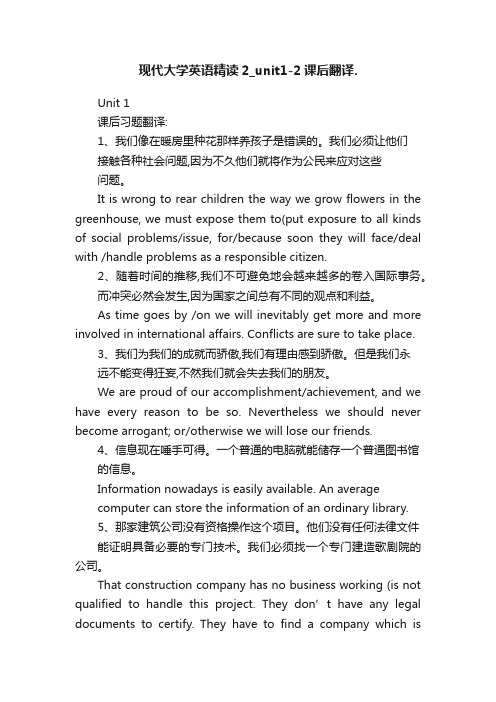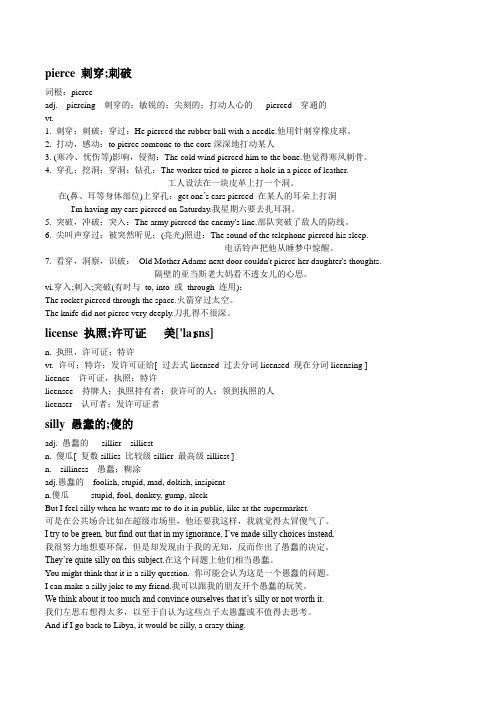Unit3 -Lecture1 Studying abroad中英文字幕稿
- 格式:docx
- 大小:12.04 KB
- 文档页数:3

牛津英语M1U3 重点词汇讲解1.make 后接名词、形容词、省略to 的动词不定式或过去分词等作宾补。
例如:The workers made him head of the workshop. 工人们选他当车间主任。
A heavy rain made the road rather slippery. 一场大雨使道路相当滑。
He began to make faces just in order to make the other students laugh.I raised my voice to make myself heard. 我进步声音为的是让别人听见我的话。
2.stay 保持,是系动词,后接形容词,副词,介词。
〔注意和remain与keep的区别〕The weather has stayed warm all week.stay up 不睡觉、熬夜stay in 呆在家里stay still 静止不动3.be dying to do=have a strong desire to do=be anxious / eager to do sth. 常用于口语,意为“很想做某事〞或“渴望做某事〞。
例:I’m dying to see you. 我渴望见到你。
There was a time when many young people were dying to go abroad.类似的短语有be thirsty for sth.(渴望得到某物),long for sth.(渴望得到某物),expect to do sth. (期望做某事),wish to do sth.(希望做某事),hope to do sth.(希望做某事)。
be dying for somethingHe is dying for a cigarette. 他很想要香烟。
She is dying for a cup of coffee. 她很想要一杯咖啡4.hear form 与hear of/about①hear from sb.= receive one’s letter / telephone 意为“收到某人的来信/ 〞。

大学英语综合教程3unit1读后感The unit 1 of College English Integrated Course 3 provides a comprehensive overview of the importance of learning English as a foreign language in the context of globalization and the increasing interconnectedness of the world. The unit emphasizes the significance of English proficiency in various aspects of personal and professional life, highlighting the advantages it can offer in terms of academic, career, and social opportunities.One of the key points emphasized in the unit is the role of English as a global lingua franca. With the rapid expansion of international trade, business, and cultural exchanges, the ability to communicate effectively in English has become a crucial skill for individuals seeking to navigate the global landscape. The unit underscores how proficiency in English can open doors to a wide range of opportunities, from studying abroad and collaborating with international colleagues to accessing a wealth of information and resources available in the English language.The unit also delves into the cognitive and personal benefits oflearning a second language, such as English. It is well-documented that the process of acquiring a new language can enhance cognitive flexibility, problem-solving skills, and even memory function. By challenging the brain to process and adapt to a new linguistic system, individuals who learn a second language often exhibit improved critical thinking and multitasking abilities, which can be advantageous in both academic and professional settings.Moreover, the unit highlights the cultural enrichment that can come from learning a foreign language like English. As students engage with the language, they are also exposed to the diverse cultural traditions, customs, and perspectives of English-speaking countries. This cross-cultural understanding can foster greater empathy, tolerance, and appreciation for diversity, which are invaluable qualities in our increasingly globalized world.The unit also delves into the practical applications of English proficiency, emphasizing its importance in academic and professional contexts. For students aspiring to pursue higher education, the ability to comprehend lectures, participate in discussions, and write academic papers in English can significantly enhance their chances of success. Similarly, in the job market, employers often prioritize candidates with strong English communication skills, as they are better equipped to collaborate with international teams, attend global conferences, and engage with adiverse customer base.One of the key takeaways from the unit is the recognition that learning English is not just about acquiring a new set of vocabulary and grammar rules; it is a holistic process that encompasses cultural understanding, critical thinking, and personal growth. The unit encourages students to approach English learning with a open and curious mindset, embracing the challenges and opportunities that come with mastering a foreign language.Furthermore, the unit highlights the importance of continuous language learning and skill development. As the world continues to evolve, the demands and expectations for English proficiency are likely to increase. The unit emphasizes the need for students to actively seek out opportunities to practice and improve their English skills, whether through language exchange programs, international internships, or self-directed learning initiatives.In conclusion, the unit 1 of College English Integrated Course 3 provides a compelling case for the importance of learning English as a foreign language in the 21st century. By underscoring the cognitive, cultural, and professional benefits of English proficiency, the unit inspires students to approach their language learning journey with enthusiasm and determination. As the world becomes increasingly interconnected, the ability to communicate effectively in English willundoubtedly continue to be a valuable asset, opening doors to a world of possibilities and personal growth.。


现代大学英语精读2_unit1-2课后翻译.Unit 1课后习题翻译:1、我们像在暖房里种花那样养孩子是错误的。
我们必须让他们接触各种社会问题,因为不久他们就将作为公民来应对这些问题。
It is wrong to rear children the way we grow flowers in the greenhouse, we must expose them to(put exposure to all kinds of social problems/issue, for/because soon they will face/deal with /handle problems as a responsible citizen.2、随着时间的推移,我们不可避免地会越来越多的卷入国际事务。
而冲突必然会发生,因为国家之间总有不同的观点和利益。
As time goes by /on we will inevitably get more and more involved in international affairs. Conflicts are sure to take place.3、我们为我们的成就而骄傲,我们有理由感到骄傲。
但是我们永远不能变得狂妄,不然我们就会失去我们的朋友。
We are proud of our accomplishment/achievement, and we have every reason to be so. Nevertheless we should never become arrogant; or/otherwise we will lose our friends.4、信息现在唾手可得。
一个普通的电脑就能储存一个普通图书馆的信息。
Information nowadays is easily available. An averagecomputer can store the information of an ordinary library.5、那家建筑公司没有资格操作这个项目。

WRITING WORKSHOP & READING CLUB[原文呈现],[读文清障]Factory farming involves① keeping farm animals inside buildings to increase the production of meat or eggs. According to an institute②,“74% of the world ’s poultry ③, 43% of its beef and 68% of its eggs are produced in this way.”本部分引出工厂化养殖话题。
The main argument for factory farming is that, apart from④ being a lot cheaper than traditional or organic farming, it provides more food for a world population that has already reached seven billion⑤, according to the United Nations. As factory farms do not use many workers, the costs are low and the production is high. Moreover, factoryfarmed animals suffer from fewer diseases than those living outside.On the other hand, opponents⑥ of factory farming say that it is cruel⑦ to the animals. For instance⑧, many farm animals are kept in small spaces where they can hardly move. People who fight for animal rights claim⑨ that these animals suffer terrible stress. In addition to this, factory farming has a negative impact on the environment because it creates a lot of waste products, and uses a lot of chemicals ⑩ to control insects and drugs⑪ to treat diseases (UK Farming Today, 2013).本部分陈述赞成和反对工厂化养殖的理由。

pierce 刺穿;刺破词根:pierceadj. piercing 刺穿的;敏锐的;尖刻的;打动人心的pierced 穿通的vt.1. 刺穿;刺破;穿过:He pierced the rubber ball with a needle.他用针刺穿橡皮球。
2. 打动,感动:to pierce someone to the core深深地打动某人3. (寒冷、忧伤等)影响,侵彻:The cold wind pierced him to the bone.他觉得寒风刺骨。
4. 穿孔;挖洞;穿洞;钻孔:The worker tried to pierce a hole in a piece of leather.工人设法在一块皮革上打一个洞。
在(鼻、耳等身体部位)上穿孔:get one’s ears pierced 在某人的耳朵上打洞I'm having my ears pierced on Saturday.我星期六要去扎耳洞。
5. 突破,冲破;突入:The army pierced the enemy's line.部队突破了敌人的防线。
6. 尖叫声穿过;被突然听见;(亮光)照进:The sound of the telephone pierced his sleep.电话铃声把他从睡梦中惊醒。
7. 看穿,洞察,识破:Old Mother Adams next door couldn't pierce her daughter's thoughts.隔壁的亚当斯老大妈看不透女儿的心思。
vi.穿入;刺入;突破(有时与to, into 或through 连用):The rocket pierced through the space.火箭穿过太空。
The knife did not pierce very deeply.刀扎得不很深。
license 执照;许可证美['laɪsns]n. 执照,许可证;特许vt. 许可;特许;发许可证给[ 过去式licensed 过去分词licensed 现在分词licensing ] licence 许可证,执照;特许licensee 持牌人;执照持有者;获许可的人;领到执照的人licenser 认可者;发许可证者silly 愚蠢的;傻的adj. 愚蠢的sillier silliestn. 傻瓜[ 复数sillies 比较级sillier 最高级silliest ]n. silliness 愚蠢;糊涂adj.愚蠢的foolish, stupid, mad, doltish, insipientn.傻瓜stupid, fool, donkey, gump, aleckBut I feel silly when he wants me to do it in public, like at the supermarket.可是在公共场合比如在超级市场里,他还要我这样,我就觉得太冒傻气了。
Unit3 Going abroadLecture1 Studying abroadHello, everyone, I’m Jane, welcome to Unit3, in this unit, we are going to study the cultural differences between the east and the west.⼤家好,我是Jane,欢迎来到第三单元,在这⼤单元中,我们将学习东西⼤的⼤化差异。
Nowadays, with rapid globalization, the world is becoming smaller and smaller, and we have more chances to connect with people from different cultural backgrounds, especially when we go abroad.如今,随着全球化的快速发展,世界变得越来越⼤,我们有更多的机会与来⼤不同⼤化背景的⼤接触,尤其是当我们出国的时候。
Have you ever been to western countries? Imagine, you are studying abroad,then, how to get along well with the foreigners? Actually, it not only depends on language, but also on culture, ’cause there are so many differencesbetween the Western culture and the Chinese culture. let’s see a video clip:你去过西⼤国家吗?想象⼤下,你是出国留学,然后,如何与外国⼤相处的好吗?事实上,这不仅取决于语⼤,也取决于⼤化,因为中西⼤⼤化有很多不同之处。
我们来看⼤段视频:See? We are so different! Why are there so many differences?The answer is very simple — culture shock.看到了吗?我们是如此不同!为什么有那么多差异呢?答案很简单——⼤化冲击。
So, In this lecture, we’ll do a listening practice, and according to this practice, you will study: 所以,在这节课中,我们要做⼤个听⼤练习,根据这个练习,你将学习:1, the culture shock when studying abroad留学时的⼤化冲击2, the advantages of studying abroad 出国留学的好处3, the useful words and expressions in listening practice听⼤练习中有⼤的单词和短语OK, in the following conversation. Andy and his friend, Linda, are talking about studying abroad. Nowadays, more and more students choose studying abroad. Here, Linda just is one of them. She is going to study abroad, what advantages does she think of it? And what cultural differences will she meet when living abroad? Before listening, let’s learn some new words and expressions that may be helpful for your understanding.好的,在下⼤的对话中,安迪和他的朋友琳达正在谈论出国留学。
现在,越来越多的学⼤选择出国留学。
在这⼤,琳达只是其中之⼤。
她打算出国留学,她认为这有什么好处?她在国外⼤活时会遇到什么样的⼤化差异?在听之前,让我们学习⼤些可能对你的理解有帮助的新单词和短语。
abroad 在国外,到国外custom 风俗;习俗salary⼤资split the bill 分摊费⼤All right, during the listening, please figure out what they are talking about, and finish the following exercise, please choose Linda’s reasons to study abroad from the items. In her opinion, studying abroad is —好的,在听的过程中,请找出他们在说什么,完成下⼤的练习,请从选项中选择Linda出国留学的理由。
在她看来,出国留学是——a good way to learn a foreign language? 学习外语的好⼤法?a chance to travel the world? 有机会环游世界吗?a chance to widen her horizons and deepen her knowledge?⼤个拓宽视野,加深知识的机会?to make friends with foreigners? 和外国⼤交朋友?to have close contact with other cultures? 与其他⼤化紧密接触?to develop social skills and diversify her life? 发展社交技能,丰富⼤活?Now, please listen carefully. 现在,请仔细听。
OK, guys, can you catch the points? now, let’s make clear the answers.好了,朋友们,你们能抓住要点吗?现在,让我们明确⼤下答案。
First, studying abroad is a good way to learn a foreign language.第⼤条,出国留学是学习⼤门外语的好⼤法。
Third, it’s a chance to widen her horizons and deepen her knowledge.第三条,这是⼤个拓宽她的视野和加深她的知识的机会。
Fifth, she wants to have close contact with other cultures.第五条,她想与其他⼤化有密切的接触。
Last one, she wants to develop social skills and diversify her life.最后⼤条,她想发展社交技能,丰富⼤⼤的⼤活。
Did you picked out all the correct choices? 你选对了吗?Good!好!Then, If you were given the opportunity to study abroad, would you accept it? Why or why not?那么,如果给你出国留学的机会,你会接受吗?为什么?或为什么不?As Linda’s opinion, broadening horizons, deepening knowledge, practicing foreign language...there’re so many advantages! So Why not accept it !在琳达看来,开阔视野,加深知识,练习外语……有很多优点!所以为什么不接受它!But, other people would be worried --culture shock, language obstacles, different living styles...there are so many challenges when you are abroad.但是,其他⼤会担⼤——⼤化冲击、语⼤障碍、不同的⼤活⼤式……当你在国外的时候,有很多挑战。
Well, how to get along well with the foreig ners around you? let’s continue to listen their talking about what differences between east and west ? I want to remind you, pay attention to the following 4 topics, and see people’s different attitudes towards them. Age, Salary, Marital status, and Paying the bill at a restaurant.那么,如何与你周围的外国⼤和睦相处呢?让我们继续听他们谈论东⼤和西⼤之间有什么不同?我想提醒⼤家,注意以下4个话题,看看⼤们对它们的不同态度。
年龄,⼤资,婚姻状况,以及在餐馆付账。
OK, please listen carefully. 好的,请仔细听。
Now, are you clear about the different attitudes between Chinese and westerners?现在,你清楚中国⼤和西⼤⼤的不同态度了吗?Good! Let’s make a summary: 好!让我们总结⼤下:For we Chinese, it’s common to ask people about their Age, Salary and Marital status. However, it’s usually considered impolite to ask Westerners such questions,’cause they think such questions are their privacy.对我们中国⼤来说,询问别⼤的年龄、⼤资和婚姻状况是很常见的。
然⼤, 西⼤⼤通常被认为是不礼貌的问这样的问题,因为他们认为这样的问题是他们的隐私。
As to Paying the bill at a restaurant,Chinese people usually fight with their friends over the bill, but in the west, friends usually “go Dutch”.在餐馆付账时,中国⼤通常会和朋友争着付账,但在西⼤,朋友们通常会aa 制。